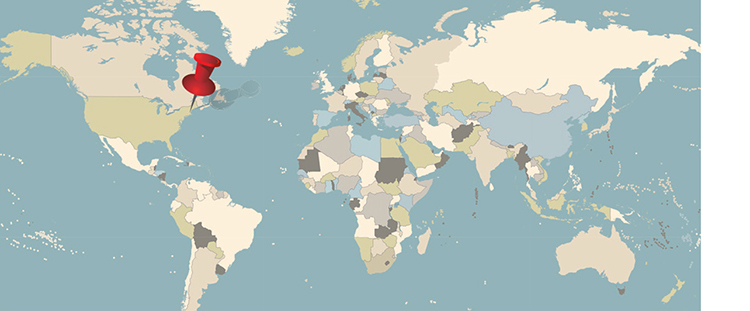Schwartz Rounds, United States
Derren Hayes
Tuesday, March 26, 2019
Schwartz Rounds are an approach that brings together staff from different professional backgrounds and disciplines to talk about the emotional and social challenges of caring for people.

It draws its name from Ken Schwartz, the man whose idea for kindness in health care led to the creation of the Schwartz Center for Compassionate Healthcare in 1995 based in Boston, Massachusetts.
Schwartz, a healthcare lawyer, came up with the idea in 1994 while receiving treatment for advanced lung cancer, and reflecting on the human connection between caregivers and patients. In articles for the Boston Globe Magazine, he wrote that "small acts of kindness" make "the unbearable bearable". He set up the Schwartz Center just before his death with an aim to nurture compassion in healthcare and encourage the sort of caregiver-patient relationships that made the difference to him.
The aim of Schwartz Rounds is to offer staff a safe environment in which to share their stories and offer support to one another. They are based on the idea of medical "grand rounds"; however, Schwartz Rounds focus on the non-clinical aspects of care in a multi-professional meeting.
The Schwartz Center has 550 organisational members, and states that 440 healthcare organisations in the US and Canada and 190 in the UK and Ireland use Schwartz Rounds, mostly in hospitals and mental health settings.
Now, the What Works Centre for Children's Social Care is to undertake a research project to assess whether Schwartz Rounds can support the wellbeing of social workers and other practitioners in children's services.
HEALTH PRACTICE
Acute healthcare is a demanding work environment and staff members are vulnerable to emotional burn-out. For example, surveys from staff at the Royal Free hospital in 2009 revealed they felt "undervalued" and "lost" with no clear sense of vision or mission. Evidence shows that staff wellbeing and patient wellbeing are inter-linked; compassionate, high-quality, patient-focused care may suffer if staff members do not receive support for their psychosocial and emotional issues raised in their day-to-day working.
Schwartz Rounds offer protected, confidential forums for this reflection and support. They are typically held once a month, at lunchtime, with food provided. The first 15 minutes is dedicated to a small panel of staff members describing their experience of a patient-care scenario. Panelists take it in turns to describe their involvement, how it made them feel and the challenges or issues it raised for them. Following this, the facilitator leads 45 minutes of discussion and reflection to explore issues raised by this case. Only staff members participate in the rounds and all discussion is confidential. The rounds are evaluated by attendees at the end of each session.
Discussion topics are diverse - at one hospital, a session focused on a patient who died from unforeseen complications despite having a relatively straightforward case. Another round involved the case of an unresponsive, terminally ill woman arriving into the hospital with "no notes", prompting a discussion of whether to continue to feed her. The round reflected on the anger felt by staff members and the challenges of community working.
Unlike other forms of supervision or professional forums, Schwartz Rounds are not used to make decisions, revise care plans or set goals. They instead provide a forum to share stories about their work and themselves and listen to others do the same.

FACTFILE
- Schwartz Rounds bring professionals working in the health sector together to share experiences of caring for people
- Rounds are held once a month and last an hour, offering protected, confidential forums for this reflection and support
- More than 400 healthcare settings use the approach in the US, and over the past decade it has been used in 150 UK health organisations
- Participating in rounds has been shown to improve worker wellbeing and help staff provide more effective compassionate care
- A UK pilot is due to begin shortly to test whether the model could be effective for use by children and family social workers
REQUIREMENTS AND COSTS
In order to conduct Schwartz Rounds, a US institution must be a member of the Schwartz Center for Compassionate Healthcare, paying a membership fee.
The Point of Care Foundation became the licence holder for Schwartz Rounds in the UK in 2009. It has received funding from the Department of Health to expand the scheme.
Schwartz Rounds must be implemented with contracted support from the Point of Care Foundation under an initial two-year contract that covers training and support.
Interested parties are invited to observe an established Schwartz Round and discuss the implications of the scheme with the Point of Care Foundation.
Several criteria must be met to provide Schwartz Rounds, including rounds being led by a senior doctor; a facilitator identified; backing from health trust senior management; and an organising committee established to set topics and evaluate sessions. Guidance recommends a core team be established of a senior doctor, facilitator, chair and business co-ordinator who are in regular contact and who have administrative support.
The Schwartz Round contract sets clear guidelines that trusts must follow. The Point of Care Foundation uses a tried-and-tested method to provide the rounds and all advice, materials and training must be adhered to. It takes three to six months from the initial observation of an established Schwartz Round to delivering the first round in a new setting.
To be a facilitator, an individual must possess: training and facilitation skills; group work skills, including understanding and experience of managing; group processes; counselling, clinical psychology or social work skills; presentation skills; and understanding of organisational culture and staff and patient experience issues.
APPLICATION TO SOCIAL CARE
Social workers are involved in Schwartz Rounds in many health settings in the UK but the What Works Centre's initiative is the first attempt to extend its application into mainstream children's services. The centre highlights how many of the pressures in the health service that can hamper development of strong patient-carer relationships also apply to professionals working with vulnerable children and families.
Children's social work suffers from high levels of workloads, turnover and vacancy rates, absence due to physical and mental illness, and professionals leaving the sector early. In addition, research has found that strong social worker relationships and workforce stability are two key ingredients for successful outcomes for vulnerable children.
The centre says that promoting workforce wellbeing is a key priority, as is finding out what works and in what circumstances. With this in mind it is calling for councils and children's trusts to test the feasibility of adapting Schwartz Rounds for social care.
The What Works Centre wants to test whether Schwartz Rounds can help children's social workers to feel more supported in their jobs, allowing time and space to think and reflect.
EVIDENCE AND IMPACT
Independent evaluation of Schwartz Rounds in the United States show that they benefit individuals, teams and hospital culture. As a consequence of attending rounds, staff reported decreased stress, decreased isolation, greater understanding and appreciation of their colleagues' roles and contributions, feeling more supported in their work, and feeling more able to provide compassionate care. The more rounds an individual attends, the greater the benefit.
Rounds were first piloted in the UK in 2009 at two sites: the Royal Free Hospital and Cheltenham Hospital. The year-long pilot was an overwhelming success; the rounds became firmly established. During the UK pilot, a sample of participants were interviewed about their experiences of the rounds.
Three themes emerged from these discussions: first, there were personal benefits including acknowledging and validating emotions, and increasing empathy; second, teamworking was strengthened; and third, workplace culture improved.
Research in 2016 by Anne Cullen for the Princess Alice Hospice in Surrey and Association of Palliative Care Social Workers, found that palliative care social workers had played a significant role in establishing Schwartz Rounds in some end-of-life services.
She concludes: "Schwartz Rounds could be helpfully introduced in other areas of activity where social workers and others are employed to provide care and protection for vulnerable people, including children and young people, where similar pressures and limitations have been identified."
EXPERT VIEW
By Julian Groves, head of staff experience programmes and resources, Point of Care Foundation
In healthcare settings, Schwartz Rounds sessions are led by a facilitator and clinical lead, and are structured around three short presentations from colleagues reflecting on an experience they have been through in their work. Usually these are connected by a common theme - such as "a patient I'll never forget", or "a good day" - and they are followed by an open discussion where anyone who wishes to can respond and share their experiences.
The simplicity of the model belies its effectiveness. Evidence has shown that people who attend rounds regularly are about half as likely to suffer psychological distress as non-attending colleagues.
At a system level, the impacts are harder to measure, but it's worth reflecting on NHS figures that show staff throughout the system are taking more stress-related absences, reporting higher levels of bullying, and reporting more pressure to come to work when they aren't well. Many staff are voting with their feet and leaving the service altogether. Properly taking care of staff has to be part of the solution to this.
Rounds are about more than just looking after staff. At their root is the objective of supporting better care for patients.
We believe rounds can offer benefits to people beyond the healthcare sector. Many of the challenges we find in the NHS are just as prevalent in other services. The need to support compassionate care is not limited to health services.
Rounds could have great impact for individuals and organisations in social care, and the pilots will enable the What Works Centre to evaluate this.




